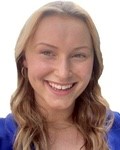This is part of a series of posts by recipients of the 2021 Career Services Summer Funding Grant. We’ve asked funding recipients to reflect on their summer experiences and talk about the industries in which they spent their summer. You can read the entire series here.
This entry is by Catherine Buren, COL ’24
 This past summer, I was very fortunate to be a summer research intern as part of a research team at the New York University Rory Meyers College of Nursing. Despite being in a seemingly terminal battle with the Covid-19 virus, I was grateful to be surrounded by a team of researchers who were compassionate and dedicated to helping members of the New York community, in a professional laboratory environment which both cultivated and encouraged new ideas.
This past summer, I was very fortunate to be a summer research intern as part of a research team at the New York University Rory Meyers College of Nursing. Despite being in a seemingly terminal battle with the Covid-19 virus, I was grateful to be surrounded by a team of researchers who were compassionate and dedicated to helping members of the New York community, in a professional laboratory environment which both cultivated and encouraged new ideas.
During my summer experience, I conducted qualitative research through interviewing patients being treated with dialysis, which is a treatment that treats many types of kidney malfunction or failure– for example, the kidneys of patients who have advanced chronic kidney disease (kidney failure) may not be able to clean their blood properly. With kidney failure, waste products and fluid can build up to dangerous levels in your body, and dialysis is used to treat this by maintaining homeostasis (keeping your body in balance) by: removing waste, salt and extra water to prevent these products from building up in your body, keeping a safe level of designated chemicals in the bloodstream, such as potassium, sodium and bicarbonate, as well as helping to control blood pressure. While working under the very talented Dr. Maya Clark-Cutaia, I obtained a wealth of knowledge relating to the field of qualitative research as well as experienced the professional life of an academic nursing researcher. I worked alongside nephrologists, nurses with backgrounds in social work, and clinical dialysis nurses as well as other health sciences students, assisting with everything from clinical measurements to data entry and analysis.
I appreciated that my day to day responsibilities were always variable because I was always in a position to ask questions and learn a new skill. I was responsible for tasks including: database development and management, data entry, data collection, manuscript development, literature searches, as well as weekly research team meetings. I am very thankful to have gotten first-hand experience in the field of academic nursing, a field which I first learned about through my health care management courses. Through thorough examination of interviewee files in various databases, I was able to collect nurses’ data and analyze trends based on interviews conducted across several different dialysis clinics in New York City. I learned about why some nurses chose not to be vaccinated against the Covid-19 virus, and how their decisions were affected by factors such as the Johnson & Johnson vaccine recall and the introduction of the Delta variant. It was eye-opening to learn about nurses who did not necessarily advocate for vaccination against Covid-19 despite being key members of the healthcare field.
In addition to conducting qualitative interviews with nurses, I also had the opportunity to shadow nurses during their classes at the NYU Rory Meyers College of Nursing as well as in the teaching hospital setting. I am thankful to have received a generous grant from Career Services, which I was able to use for transportation and living expenses and allowed me to maximize my experience through clinical exposure. As a student who is eager to pursue a career in health care, this clinical experience provided me with great insight into the daily life of a nurse who is also an academic researcher. From the day I was offered a position in the lab, I was welcomed by a staff with a wide range of skills and expertise and was exposed to a lot of the research process from IRB approval, all the way through to publishing a manuscript.
This summer has provided me a look into what my life could look like as a nurse in an academic setting, including all the commitment and compassion this kind of career requires. I am now more confident in my decision to pursue a nursing education and am now also open to working in an academic nursing setting, like my mentor. Although the pandemic definitely impacted our research project, I was glad to be able to interact with the nurses I was interviewing at an intimate level and feel truly immersed in the nursing field. I am grateful for the opportunity from both NYU and Penn and am excited to use my newfound knowledge toward my health care studies!




